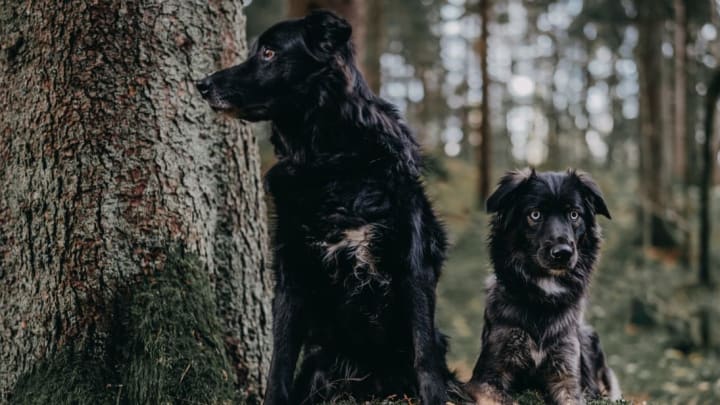Just like how an older sibling might act out when a new baby joins the family, a 2014 study from PLOS ONE suggests dogs get jealous when they perceive there is a rival for their owners' attention.
To test this, UC San Diego psychology professor Christine Harris and former honors student Caroline Prouvost adapted a test usually applied to 6-month-old human babies. 36 dogs and their owners participated. Each pair was videotaped at home as the owner ignored the dog in favor of three different stand-ins: An animated stuffed dog that barked and wagged its tail; a jack-o-lantern; and a children's book with pop-ups and sounds. In the case of the toy dog and the jack-o-lantern, owners—who were not informed ahead of time of the hypothesis—were instructed to treat the object as if it were a real dog. The book served as a control; owners read aloud as if to a child.
From there, two independent raters watched the videos and coded them for a variety of aggressive, disruptive, and/or attention-seeking behaviors that would indicate jealousy. What they found was that most of dogs exhibited some signs of jealousy—primarily pushing or touching the owner or object but also snapping at the toy—when their owner interacted with the fake dog. The jack-o-lantern was perceived as less of a threat and the book least of all. Harris also noted that 86 percent of dogs sniffed the toy dog's rear end at some point, indicating that they believed it to be a real dog.
The study predicts that the jealous behavior would be even more pronounced in situations where the rival for the owners' attention was a real dog that responded to the attention. "Our study suggests not only that dogs do engage in what appear to be jealous behaviors but also that they were seeking to break up the connection between the owner and a seeming rival," Harris said. "We can't really speak to the dogs' subjective experiences, of course, but it looks as though they were motivated to protect an important social relationship."
The implication of jealousy in dogs may mean that, contrary to some writing on the subject, it is not necessarily a social construct unique to romantic relationships. "Our results challenge these ideas, showing that animals besides ourselves display strong distress whenever a rival usurps a loved one's affection," Harris said.
This story has been updated for 2020.
